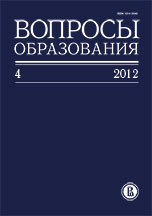Analyzing Pre-Theoretical Foundations in Sociology of Education: Explication of Basic Metaphors
Abstract
David Konstantinovsky, D.Sc. in Sociology, Director of the Center for Sociology of Education, Science and Culture, Institute of Sociology, Russian Academy of Sciences, Moscow, Russian Federation. Email: scan21@mail.ru
Address: Bld. 5, 24/35 Krzhizhanovskogo St., Moscow, 117218, Russian Federation.
Viktor Vakhshtayn, Ph.D. in Sociology, senior researcher at the Centre for Fundamental Sociology, Institute for Theoretical and Historical Studies in the Humanities, National Research University — Higher School of Economics, Moscow, Russian Federation. Email: avigdor2@yahoo.com
Dmitry Kurakin, Ph.D. in Sociology, research fellow at the Centre for Fundamental Sociology,Institute for Theoretical and Historical Studies in the Humanities, National Research University — Higher School of Economics, Moscow, Russian Federation. Email: kourakine@yandex.ru
This is an analysis of metaphorical foundations of sociological studies in education. The authors show the mechanics of descriptive languages in research with specific examples from their own empirical projects.
Assuming that theoretical foundation—conceptual definitions and research hypotheses—is based on non-theoretical, or pre-theoretical, factors, the authors demonstrate connection between scientific concepts and their pre-theoretical basis.
Using the metaphor theory to explicate axiomatic assumptions, they regard sociological studies as a series of ‘translations’ between mutually impenetrable linguistic worlds (the world of common sense, the world of sociological theory, the world of management decisions). The paper discovers transition points where research acquires or loses its strictly scientific nature. Purely scientific methods are only used for conceptualization, development of tools and data interpretation. Basic metaphors (the axiomatic level) are rather associated with intuition and imagination, field data collection has to do with the logic of common sense, while managing skills and development of recommendations belong to the sphere of management. Methodological implications of metaphorical shifts and effects of an ‘uncontrolled metaphorical expansion’ are discussed in the paper. The authors study in detail the metaphors of organism and market as applied to education.
As implicit expansion (transfer of properties from auxiliary object to main object) is the fundamental property of metaphor, the authors believe that explication of research metaphors may facilitate significantly solving the problem of ‘translation’ between different ‘realities’ of the research process.









